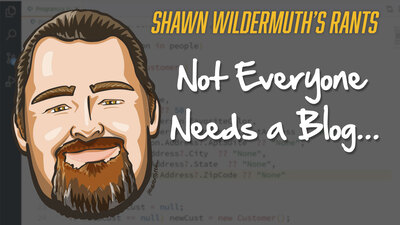My Rants and Raves

In this new Maintainers video, I talk with Cake Maintainer about how he manages the project and what motivates him.

I've started staying on top of early releases on .NET 7 and C# 11 already. In this new Coding Shorts video, I look at four of the released changes to C# and hopefully you can get a head start on seeing where C# is going.

I'm happy to see that instead, they've adopted Pinia as an alternative. I am not in love with Pinia (as I use reactive objects more often) but for complex scenarios it reminds me of something closer to the Composition API.

I went on the WebRush podcast (with John Papa and Dan Whalin (et al.)) and had a discussion about reactive() and ref() in the Composition API that resulted in this video.

This is an important day for me. As many of you know, I've become a little bit of a film maker over the past few years. I feel like it's been building up to this new film I've spent the last two years making.

I'm back at my rants. In this sixth episode, I admit that I've been a bit hypocritical about my own dislike of some well known technologies.

Well, 2021 is finally over. I thought 2020 couldn't be topped, but 2021 wasn't much better for most.

I have two new Coding Shorts videos. Theh first is about Angular Template Forms and the latest is about using Vite for production builds.

TailwindCSS might seem like an odd way to build your CSS at first; but this would be viewing it through an opinionated framework (like Bootstrap). I think you might be missing the whole idea of TailwindCSS.

Minimal APIs in .NET 6 aren't even released yet, but I want to start thinking about how to structure larger projects. While Controllers are still a valid option, for medium size projects, you have options on how to structure your APIs.

After discussing language on Twitter, it got me thinking about my own role in programming language elitism.

As many of you know, I've been making films for a little while. Now that I have three shorts and one feature under my belt, it seemed like a good time to create an umbrella project for the films. Introducing Twain Films!

I've only started to look into Custom Elements (e.g. Web Components) and my trip started with Vue 3.2. They have a new facility to support custom elements created as Vue Components.

It's been a long week. I mean a really long week. As many of you know, I'm a board member of the .NET Foundation. This hasn't been an easy week for the foundation.

I've been thinking a lot about how we evaluate and hire developers. I think the value proposition is more tuned for recruiters and HR departments than for development teams. I think that needs to change.

We recorded this at KCDC 2021. It's a project I'm contributing to and I really like what it's trying to do.

When I first started using Vue, I liked the ability to just drop the vue library on a page, and create some simple interactivity. While this still works, most people use Vue for larger, compiled projects.

I finally got to speak at a live event! This week I headed to Kansas City for KCDC, one of my favorite regional events.

Over the years, I've talked to many a software developer. Some of the most common questions are about "how to become an Microsoft MVP?", "what language should I learn?", and "how do I make the most money as a developer?". The problem here is that people think there is one way to have a career - my path isn't necessary for everyone.

Setting up ASP.NET Core for APIs isn't what I would called complex, but it does involve it's own set of boilerplate. To provide flexibility, .NET 6 now supports Minimal APIs, let's dig into how it works.

I get tagged in a lot of discussion about Dapper vs. Entity Framework. This feels like nHibernate v. Linq2Sql redux. Well, I think about it very differently.

I'm finally finishing up my studio/office in the house. With that, I'm getting back to making my "Coding Shorts" videos. If you're enjoying them, please let me know.

I blame Joseph Guadagno. His post on how to setup a coding stream made it look too easy. So I'm diving in. I'm going to be live coding every Wednesday at 1pm (UTC-4).

I was recently working with a client and they were having an odd problem with Angular. They'd build their Angular apps in isolation then move them into an ASP.NET Core project and their asset links would break. Let's look at why this happens and how to address it.